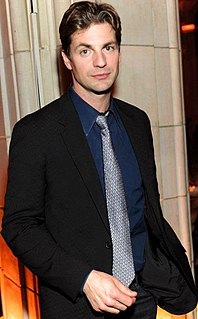A Quote by Geoffrey Rush
There's often rarely any dialogue in a sex scene. With your fellow actor, it's good to talk about what the unspoken dialogue is, that's happening in the scene. You've got to play something rather than feel self-conscious or exposed.
Related Quotes
Rewriting isn't just about dialogue, it's the order of the scenes, how you finish a scene, how you get into a scene. All these final decisions are best made when you're there, watching. It's really enjoyable, but you've got to be there at the director's invitation. You can't just barge in and say, "I'm the writer."
You are preparing yourself for a scene, and the most important thing is to remain emotionally available and remain in the moment with your scene partner. You don't want to let your own self-consciousness block the flow of creativity that's coming out so that you can act and react, and play what the scene is all about.
I actually went to see 'Rushmore,' and I came late, and I missed myself. It was great, that scene. I caught that scene the other day on TV, funny enough, the first scene that you see with Jason Schwartzman and myself, where we talk about his grades. That's a brilliant scene, and I have to say, we play it brilliantly.

































